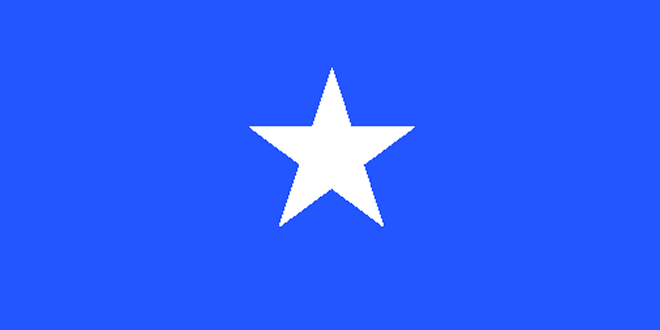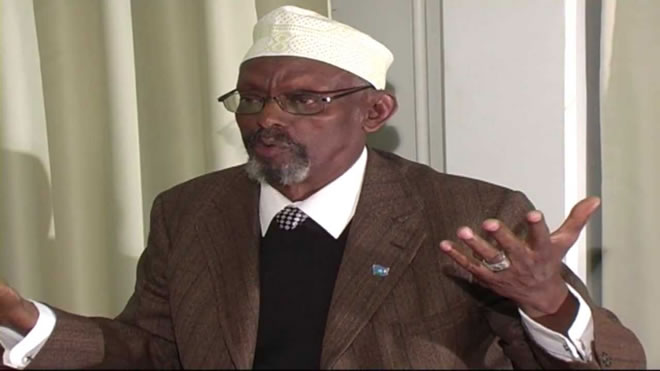by Abdulkadir Khalif
Sunday, July 12, 2015

During this July Somalia turned 55, but it was on 1st July 2001 when I happened to meet Mustafa Sheikh Elmi, one of the best playwrights and composers in Mogadishu, sitting with folks at a tiny teashop.
It was at Huriwa district in the north-western suburbs of the city.
At the time, Mogadishu was basically split into fiefdoms and the portions ruled by clan-based militias that were directed by battle-hardened warlords: Mohamed Qanyare, Osman Atto, Hussein Aideed, Muse Yalahow, you name it.
Each possessed merciless militias that waged assaults on each other as well as ravaging entire neighbourhoods. They kept Somalia drifting like a piece of wood in a river.
All of a sudden, one of the men sitting with Mustafa blew a whistle, saying, “Hey chaps, don’t you realise today is July 1.”
Mustafa said that he knew it was the first day of July, Somalia’s Independence and Unity Day, adding, “I am not surprised that it was deliberately killed.”
He recalled the actual Independence Day in Mogadishu in 1960. He said that he was a young tailor then, working hard to earn a living.

Playwright and Composer Mustafa Sheikh Elmi
“To Somalis on that day, independence meant everything,” said Mustafa. “It was an event that people were talking in anticipation for months.”
Following a short pause, Mustafa continued, “When Somalia’s flag, the five-point star, was raised above the parliament building at the heart of Mogadishu while the Italian flag was lowered, to me the air moving through my mouth suddenly started testing sugary.”
He anticipated that in independent Somalia, everything would be unrestricted and people could walk to the shops to get what they wanted, free of charge.
“That was the overwhelming feeling about a nation gaining its independence,” he remarked, adding that even criminals were expected to stop their bad acts and that all citizens would become like brothers and sisters.
The festivities continued for a whole day, with individuals spontaneously hugging each other.
More recently, I asked Aidarous Ahmed Hassan, an engineer in Mogadishu, if he could remember anything about Independence Day.
“When the national flag was raised above the parliament building at midnight and people cheered, I sought to go home,” said Hassan. “I was just 8 years old."
“But, after walking for about 10 minutes along Bondhere street towards my family house, fireworks filled the sky,” he remembered.
“Being my first experience, I believed the fireworks were live embers descending on my body.”
He remembered how much he got frightened and cried, and the way a young couple found him and consoled him.
“The couple was nice to me and escorted me home.”
Fond memories
I, too, have some good memories of July 1st celebrations in the 1960s.
For most of my primary schooling, I was among kids chosen to perform gymnastics on the eve of the 1st July anniversary at the main square of my hometown Beletweyne, 335 km north of Mogadishu.
Among the schoolboys, I used to enjoy people spotting me and pointing at my direction while exercising aerobics, often handling rings or sticks. The rhythm was at its best when the main drum was diligently beaten by Ahmed Said, a student in the senior classes, nowadays an academic in Mogadishu often lovingly called Il professore.
For nearly 10 years, July 1 was the best celebrated day, not only for being the day Southern Somalia got independence from Italian rule, but also for being the union day of the liberated former British Somaliland Protectorate.
Houses were painted in advance and flags rose above the doors for at least a week. Some people even patriotically painted tree trunks with national emblems while municipal workers left flags hanging from lampposts.
Not only the night events epitomised by the raising of the flag pulled crowds. The day's events were gloriously observed.
Every town provided a parade ground for soldiers to march and students to display their colourful uniforms as workers displayed their crafts and local authority officials made speeches.
In my hometown, cultural events dominated the afternoons, especially as talented men and women danced to the tune of folklore rhythms.
Despite the passage of time, Hassan remembers how much people talked in the 1960s about July 1st weeks before the day arrived. It was a sign that the day touched the hearts and souls of an entire nation.
All that euphoria and positive reception were significantly diminished by a single event that occurred on October 21, 1969, just 112 days after the last July 1st festivities were held.
Army officers led by General Mohamed Siad Barre overthrew the civilian government. The day the coup d'état was staged was named ‘the revolutionary day.’
October 21was officially made ‘the national day’ because it was advertised to symbolise the day "the glorious armed personnel" overthrew "corrupt civilians" and led the nation on a revolutionary path.
Clearly, army officers rising to power marked the abrupt death of 1st July.
Coup aftermath
To further undermine the Independence Day, the Somali Revolutionary Socialist Party (SRSP), which was to become the only political association in the country, was announced on 1st July, 1976.
Ever since, the day was labelled as ‘the Party Day.’ Hence, programmes by state media glorified July 1 as the day the nation attained its ideal, socialist political path that would one day lead to communism.
Only few commentaries were reserved to associate 1st of July with Somalia’s Independence and Unity Day.
The junta hoped that its rule in Somalia would last forever. But, as the dictatorship got brutal, the answer became clan-based rebel groups savagely fighting the system.
Finally, the strongman had to flee the presidential palace on January 26, 1991 when rag-tag, rebel militias circled Villa Somalia.
Yet so brainwashed had many people become that they continued to associate July 1 with the SRSP.
During the anarchic years in the 1990s and 2000s, July 1st hardly had any value. Nut these days, with the gradual institution of a federal republic, the nation is re-embracing its most important day.
July 1st is being festooned as the day that symbolised the three most important national milestones: Freedom from the colonial rulers, national unity and start of Somalia’s self-rule as a democratic state where power truly belonged to the people.
Up until army officers robbed the nation’s glory, Somalis had enjoyed nearly ten years of democracy, yielding to three general elections, two elected presidents and three prime ministers.
Today, Mogadishu’s international airport is named after the first president of Somalia, Adan Abdulle Osman alias Adan Adde, who upon losing an election peacefully in 1967 surrendered the seat at Villa Somalia to the winner, Abdirashid Ali Sharmarke.
Sharmarke was the father of Somalia’s current federal Prime Minister Omar Abdirashid Sharmarke.
During the 21 years of military rule, an entire generation knew only one dictator. In the subsequent two decades of warlords, rag-tag militias and vicious jihadists, the nation has known only chaos.
In 2015, the choice is simple and clear: No more dictatorship, lawlessness or clergymen turned wild by jihadi ideology.
The underlying message to the leaders is to restore the glory signified by July 1, including democratic rule that empowers the people to choose their leaders through the ballot.
“At 55 Somalia is not pleased with its performance,” Hassan says, speaking like an evangelist.
“We unchained ourselves from colonial rule on July 1st 1960, but over the years employed our own minds to ignore the day, to humiliate it."
This story originally appeared at Africa Review